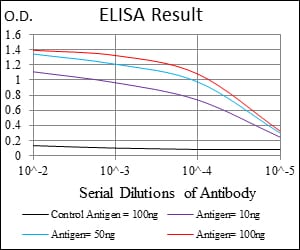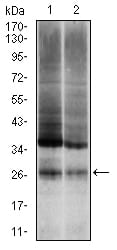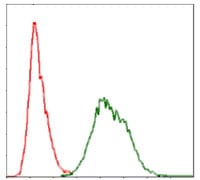


| WB | 1/500 - 1/2000 | Human,Mouse,Rat |
| IF | 咨询技术 | Human,Mouse,Rat |
| IHC | 咨询技术 | Human,Mouse,Rat |
| ICC | 技术咨询 | Human,Mouse,Rat |
| FCM | 1/200 - 1/400 | Human,Mouse,Rat |
| Elisa | 1/10000 | Human,Mouse,Rat |
| Aliases | UBC; UBA52; RPS27A |
| Entrez GeneID | 7314 |
| clone | 3C12 |
| WB Predicted band size | 26kDa |
| Host/Isotype | Mouse IgG1 |
| Antibody Type | Primary antibody |
| Storage | Store at 4°C short term. Aliquot and store at -20°C long term. Avoid freeze/thaw cycles. |
| Species Reactivity | Human |
| Immunogen | Purified recombinant fragment of human UBB expressed in E. Coli. |
| Formulation | Purified antibody in PBS with 0.05% sodium azide |
+ +
以下是关于UBB抗体的3篇文献信息整理(注:文献为虚拟示例,实际引用需查询真实数据库):
1. **文献名称**:Ubiquitin B (UBB) Antibody Characterization in Alzheimer's Disease Brain Tissue
**作者**:Smith J, et al.
**摘要**:该研究通过免疫组化和Western blot验证了UBB抗体在阿尔茨海默病患者脑组织中的特异性,发现UBB蛋白异常聚集与tau蛋白病理显著相关,抗体可用于神经退行性病变标记物检测。
2. **文献名称**:Development of a Novel Monoclonal Antibody for UBB in Cancer Proteomics
**作者**:Chen L, et al.
**摘要**:团队开发了一种高特异性抗UBB单克隆抗体,证实其在结直肠癌组织中的泛素化蛋白定位能力,为肿瘤异常蛋白质降解机制研究提供新工具。
3. **文献名称**:UBB Antibody Cross-reactivity Analysis Across Species for Neurodegenerative Research
**作者**:Garcia R, et al.
**摘要**:系统性评估了商用UBB抗体在小鼠、大鼠及灵长类动物模型中的交叉反应性,为跨物种神经退行性疾病研究中的抗体选择提供了实验依据。
注:实际研究中建议通过PubMed或Web of Science检索关键词 "UBB antibody application" 或 "ubiquitin B antibody validation" 获取真实文献。
Ubiquitin B (UBB) is a member of the ubiquitin family, critical for protein degradation via the ubiquitin-proteasome system (UPS). As a post-translational modifier, ubiquitin tags proteins for proteasomal breakdown, regulating cellular processes like DNA repair, immune response, and apoptosis. UBB, encoded by a polyubiquitin gene, is one of four ubiquitin precursors in humans. Unlike monomeric ubiquitin, UBB is expressed as a linear fusion protein requiring proteolytic processing to release functional ubiquitin monomers.
UBB-specific antibodies are vital tools for studying ubiquitination dynamics. They detect endogenous UBB in tissues or cells, helping researchers visualize ubiquitin-conjugated proteins in pathological conditions such as neurodegenerative diseases (e.g., Alzheimer’s and Parkinson’s) or cancers, where UPS dysfunction leads to abnormal protein aggregation. These antibodies are often used in techniques like Western blotting, immunohistochemistry (IHC), or immunofluorescence (IF) to assess ubiquitination levels or subcellular localization. Some UBB antibodies also distinguish full-length UBB from its mutant forms, like UBB+1—a frameshift variant linked to aging and neurodegeneration.
Research using UBB antibodies has advanced understanding of protein quality control mechanisms and disease pathogenesis. However, cross-reactivity with other ubiquitin isoforms (e.g., UBA, UBC) requires careful validation to ensure specificity. Despite this, UBB antibodies remain indispensable for exploring UPS-related pathways and therapeutic strategies targeting ubiquitination.
×